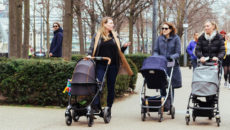My son is starting first grade this fall. He is ethnically and racially identical to us and has no behavioral issues that could be ascribed to adoption. Therefore, I’ve decided not to tell his teachers that he is adopted. I want them to get to know him for the great kid that he is and only after to find out that he’s adopted. That way, if his teachers have negative stereotypes about adopted kids, my son won’t be a victim of them. I would like to hear from other families about whether this approach makes sense. —An Adoptive Families subscriber
Editor’s Note: This thorny question is one that many Adoptive Families’ readers have confronted. Here is a sampling of their experiences:
Each Family Must Do What Feels Right
I have had all sorts of behavioral issues attributed to my children “because they were adopted,” behaviors that were in fact quite normal. And, once one teacher knew the kids were adopted, that fact was transferred as the kids moved from one grade to the next. Based on your letter, it sounds as if you are trying to strike middle ground. You are not trying to hide your child’s history. You are simply allowing him to function without the pre-existing stigmas that society often assigns adopted children.
Educating the educators is appropriate but so is choosing the time for the lesson. I would guess that you already have some sort of natural feeling about this given the environment your child will be in. Go have a parent/teacher meeting and get to know the teacher. You might feel differently after such a meeting. Chances are, at some point, some teacher in your child’s life will be touched by adoption in some way.
My wife and I have never made a big deal about our children’s adoptive status at school. For our first child, it didn’t come up until my daughter had to do one of those infamous family tree projects which didn’t allow for adoption, stepparents, single-parents, etc. We talked to the teacher about it, and voila, new chart and new assignment. In the case of my second child, because her adoption is very open, talking to a pre-school teacher about some aspects was necessary. By the third child, we were a known quantity at school!
Everyone has to strike out on their own and make a decision based on their child and the child’s environment. Regretfully, there is no formula for it. You should play the cards as you see fit (how’s that for empowerment). If there is something germane to the education of your child that requires that educator’s have knowledge of their status, then tell them. —Bob, California
Treat the Subject Naturally
Teachers spend an awful lot of time with our kids and often get very attached to them. And sooner or later, they’re likely to focus on an assignment that may cause our kids some problems. That’s probably the context in which I would bring it up: “My child was adopted. We don’t make a big deal out of it, but I thought you should know just in case you plan any assignments that involve birth or genetics or family history.” —Virginia, Colorado
You May Have Less Choice Than You Think
An incident convinced me of the importance of telling my son’s teachers about his adoption. His first grade teacher called me at work to report that he seemed to be “hallucinating.” He was talking about how his mother had died and he hadn’t seen his brothers and sisters since he was a baby. His teacher knew him as the only child of a single mom who was very much alive. I explained that he was talking about his deceased birth mother and his birth siblings. —Maria, Massachusetts
Help Change Adoption Stereotypes
Let me offer a larger view of why you should tell your son’s teacher he was adopted. Perhaps some of the public perception of emotional difficulties among adoptees stems from a subset of children who cannot hide their adoptive status (kids adopted as older children, kids whose histories include foster care or institutionalization, kids who are of a different race or culture than their parents). Are we not perpetuating these stereotypes by not being more open about the adoptive status of the much larger pool of children who can “pass” as not adopted? To change stereotypes for all adopted children those of us who had no choice about revealing such information need the help of those of you who have a choice. —Diane, New York
Include Adoption Information as Appropriate
This year my son’s teacher (3rd grade) gave the parents a homework assignment. She asked us to write a letter about our child including their hobbies, activities, strengths and weaknesses, teaching and discipline styles they respond to, any medical issues, anything going on at home she should know about. I thought it was great that this teacher was going to such lengths to gain insight into each student. I wrote her a two-page letter about my son. I wondered at first whether to mention that he was adopted. In the end I decided to include a paragraph stating that Joel might feel different at times for several reasons: he’s taller than most kids, he’s got a learning disability, and he was adopted as an infant. I know that he does feel different in these ways because we’ve talked about it. Adoption has always been talked about in our family, and I think he’s comfortable with it. But he is aware that most of the families of his friends were not formed in the same way. —Miriam, New York
What Message Do You Send Your Child by Not Telling? A Professional’s Perspective
by Debbie Riley, director of the Center for Adoption Support and Education (C.A.S.E.), in Silver Spring, Maryland
We often hear parents voice concern about teachers’ perceptions of children who joined their families through adoption. The fear can be considerable, particularly when we realize that educators generally do not have opportunities to learn how to talk comfortably and appropriately about adoption.
In considering whether to tell your son’s teachers that he was adopted, consider the possible consequences. How might your child interpret your decision not to talk about his adoption? If he is aware that you would like to keep his adoption quiet at school, he might assume, as children often do about subjects that adults avoid, that you find adoption shameful or embarrassing. This is probably not what you prefer. If he is unaware of your decision, it’s possible that he will mention his adoption in class. In that case, his teacher may be unprepared to respond positively, and may also believe your silence is a message that you do not want it discussed in any way.
My suggestion is that you take steps to help dispel any myths your son’s teacher might have about adoption. For example, meet his teacher with the intent of sharing the fact that you are an adoptive family as part of the other information you would like her to know about your son, including his many strengths. Ask her to let you know if anything related to adoption comes up during the year, so that you can discuss it at home with your son. Let her know that you hope that she will be helpful and understanding if adoption comes up in class.
Editor’s Note: for further information on educational resources about adoption developed by C.A.S.E, go to www.adoptionsupport.org.



